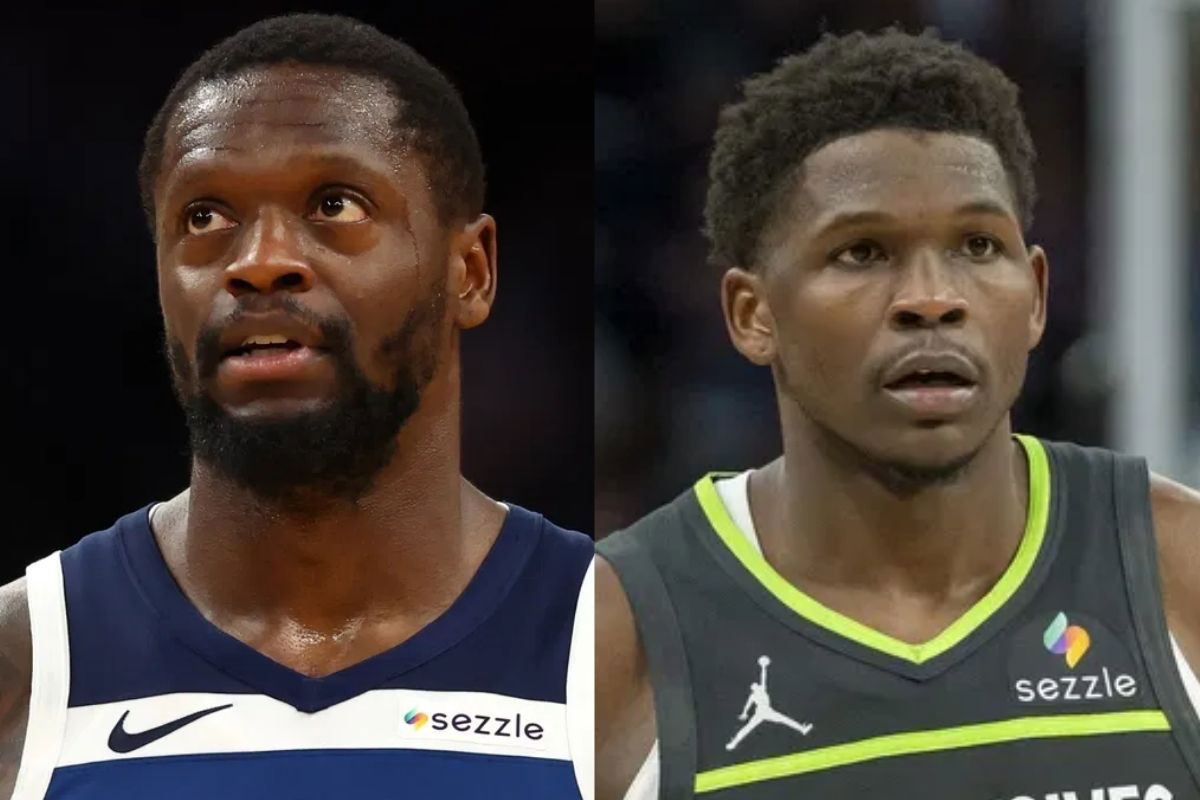
Imago
Julius Randle, Anthony Edwards

Imago
Julius Randle, Anthony Edwards
Julius Randle has a way of turning a locker room whisper into a roar. For the Minnesota Timberwolves, last season’s playoff stretch offered a lesson in patience and timing, and Randle delivered. His shift from a 25-point-per-game anchor to an 18.7-point, 4.7 assist facilitator is changing the team’s pulse and has the Wolves bracing for bigger things this upcoming 2025/26 season.
Watch What’s Trending Now!
Dane Moore discussed it on his NBA Podcast, saying, “I said it was like it was even like 14-7 when it was like the best there at the end of the year. It doesn’t need to be 20 for this to be a good offensive team.” Randle’s numbers in the playoffs hinted at the nuance. While he could expand when necessary, the focus wasn’t on piling points, but on orchestrating and letting Minnesota’s other pieces thrive.
ADVERTISEMENT
Jon Moore, to that, added, “He has familiarity, comfort, contract, and he’s healthy. All of that conspires for him to know exactly who he is in this team, what they need, and that he can deliver it… And so I think there are—there are a lot of workarounds that Chris Finch has at his disposal this year.” That reassurance is huge. With Anthony Edwards pushing toward MVP-level dominance, Randle’s recalibrated role is a stabilizing counterbalance.
The Wolves’ young stars need space to grow, and Randle’s developed game gives them that room. And the 2024–25 playoffs offered a concrete example. The Wolves were struggling in Oklahoma, down 2-1 against the Thunder. And Game 3 was the moment of validation. Randle dropped 24 points, 4 rebounds, and 3 assists, but his tone-setting edge commanded attention.
ADVERTISEMENT

Imago
Mar 9, 2025; Minneapolis, Minnesota, USA; Minnesota Timberwolves guard Anthony Edwards (5) shakes hands with forward Julius Randle (30) after making a shot against the San Antonio Spurs in the first half at Target Center. Mandatory Credit: Jesse Johnson-Imagn Images
“I just wanted to be aggressive,” he said. “Aggressive” meant pushing the pace, hitting timely shots, and leading without ego. “You’ve got to check your ego at the door,” he added. That mindset, paired with a Jeezy playlist fueling his fire, turned a team grappling with adversity into a unit ready to reclaim the series. And well, Randle’s statistical footprint mirrors this transformation.
ADVERTISEMENT
Last season, he averaged 18.7 points, 7.1 rebounds, and 4.7 assists in the regular season, adding efficiency where volume once dominated. His playoff averages ticked slightly higher with 19.4 points, but it was the distribution and floor management that spoke volumes. He mitigated the pressure on Minnesota’s point guard situation, proving that leadership can substitute for positional scarcity. This season, though, the stakes are higher.
ADVERTISEMENT
Julius Randle’s evolution could be the Wolves’ secret weapon
Anthony Edwards is pushing for MVP-level performance, averaging 27.6 points, 5.7 rebounds, and 4.5 assists in the previous campaign. For the Wolves to ascend from “very good” to elite, Edwards’ scoring and playmaking must translate into tangible postseason success. But Moore emphasized that Randle’s evolution eases the load. “You will see even more playmaking offensive hub stuff from Julius, which again mitigates the need for a point guard,” he said. Minnesota’s roster complements this shift.

Imago
Jan 29, 2025; Phoenix, Arizona, USA;Minnesota Timberwolves forward Julius Randle (30) reacts against the Phoenix Suns in the second half at Footprint Center. Mandatory Credit: Mark J. Rebilas-Imagn Images
Rudy Gobert anchors the defense, Mike Conley provides stability, Rob Dillingham offers depth, and Edwards brings the scoring punch. Randle’s recalibration creates space, mitigates pressure, and provides a blueprint for cohesion. The subtle adjustments of how he moves off the ball and creates for Edwards underpin the team’s ceiling. His career arc also highlights the timing. Randle, 30, signed a three-year deal with Minnesota valued at $100 million in 2025.
ADVERTISEMENT
Now in the prime window of his contract, he combines experience with a renewed understanding of his impact. Gone is the insistence on volume scoring. In its place is situational brilliance. Last season, his field goal percentage climbed to 48.5%, clearly reflecting smarter, more team-oriented play. But then again, all players are human at the end of the day, so we must factor in the psychological angle too.
ADVERTISEMENT
Randle has embraced leadership quietly but effectively. His bounce-back from the Game 2 benching against OKC demonstrated resilience. “I wanted to make sure I came in the same, whether it’s a good day or a bad day,” he said. That consistency filters down to Edwards and the rest of the roster, giving them the confidence to execute in high-pressure situations.
It’s a chain reaction, really. Each step makes way for the next. Edwards pushes for MVP-level dominance, Randle sets the tone with leadership and playmaking, and Gobert and Conley lock in on their specialties. Moore described it as a synergy where Randle’s realization of accepting he doesn’t need to score 28 points nightly unlocks the team’s potential.
The Wolves can be “truly great,” not by relying solely on one superstar, but by leveraging a strengthened Julius Randle as an indicator. With Randle as a steadying force, the Timberwolves enter the season with clarity and a game plan for contending. All eyes will be on Anthony Edwards, but the modest genius of Randle’s recalibration could decide just how high Minnesota rises.
ADVERTISEMENT
ADVERTISEMENT
ADVERTISEMENT
ADVERTISEMENT